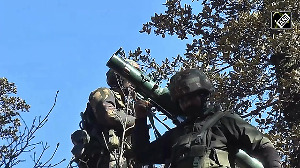The choice of de-escalation is with Pakistan as it escalated the situation with the Pahalgam terror attack and India only responded to it through Operation Sindoor, Foreign Secretary Vikram Misri said on Thursday.

His comments at a media briefing came amid heightened tensions between the two countries.
Misri said escalation started from that side (Pakistan) with the April 22 Pahalgam attack in which 26 people, mostly tourists, were killed.
"Our approach is not to escalate the situation, we only responded to the April 22 Pahalgam terror attack," he said.
On de-escalation of the situation, Misri said, "Pakistan escalated the situation, we only responded. Choice is with Pakistan."
He said at the United Nations Security Council meeting, Pakistan opposed mention of the role of terror group The Resistance Force (TRF) when it had already claimed responsibility for the Pahalgam attack.
The foreign secretary also said the retaliatory actions of Pakistan are impacting civilians, referring to firings along the Line of Control in Jammu and Kashmir.
"Pakistan's reputation as the centre of global terrorism is rooted in various terrorist attacks across the globe," Misri, flanked by Wing Commander Vyomika Singh and Colonel Sofia Qureshi, said, adding Pakistan has been pursuing cross-border terrorism against India for decades.
He said India's action on Wednesday was restrained and it was confined to terrorist infrastructure.
In retaliation for the Pahalgam terror attack, Indian armed forces early Wednesday carried out missile strikes on terror targets including Bahawalpur, a stronghold of the Jaish-e-Mohammad (JeM) terror group.
On Thursday, the defence ministry said the Pakistani military tried last night to target Awantipura, Srinagar, Jammu, Pathankot, Amritsar, Kapurthala, Jalandhar, Ludhiana, Adampur, Bhatinda, Chandigarh, Nal, Phalodi, Uttarlai, and Bhuj but these attempts were foiled and a Pakistani air defence system was destroyed in Lahore.
Misri also said Pakistan was deliberately creating roadblocks over the years on the Indus Waters Treaty issue.
Colonel Qureshi said that India's Integrated Counter-UAS Grid and Air Defence systems successfully neutralised the threats.
She further said that in response to Pakistan's attempted attacks, the Indian Armed Forces on Thursday morning targeted multiple air defence radars and systems across Pakistan.
"This morning, the Indian Armed Forces targeted Air Defence Radars and systems at a number of locations in Pakistan. Indian response has been in the same domain with same intensity as Pakistan. It has been reliably learnt that an Air Defence system at Lahore has been neutralised," she said.
Speaking about Wednesday's press briefing on 'Operation Sindoor', Colonel Qureshi said, "During the press briefing on operation Sindoor on 07 May 2025, India had called its response as focused, measured and non-escalatory. It was specifically mentioned that Pakistani military establishments had not been targeted. It was also reiterated that any attack on military targets in India will invite a suitable response."
"On the night of 07-08 May 2025, Pakistan attempted to engage a number of military targets in Northern and Western India including Awantipura, Srinagar, Jammu, Pathankot, Amritsar, Kapurthala, Jalandhar, Ludhiana, Adampur, Bhatinda, Chandigarh, Nal, Phalodi, Uttarlai, and Bhuj, using drones and missiles. These were neutralised by the Integrated Counter UAS Grid and Air Defence systems. The debris of these attacks is now being recovered from a number of locations that prove the Pakistani attacks," Colonel Qureshi said.










